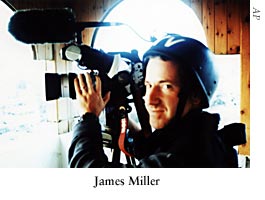New York, March 9, 2005—Israel’s army said today that it would not press criminal charges against a soldier thought responsible for the May 2003 shooting death of British freelance cameraman and film director James Miller in the Gaza Strip.
In Tel Aviv, Brig. Gen. Avichai Mandelblith told members of Miller’s family that the soldier would instead be disciplined for violating the rules of engagement and for changing his account of the incident. Mandelblith, the military’s prosecutor-general, ordered the Israel Defense Forces (IDF) to begin disciplinary proceedings. The IDF did not immediately disclose potential disciplinary measures.
“The findings of the military police show that an IDF lieutenant, the commanding officer of the IDF force at the site, allegedly fired his weapon in breach of IDF rules of engagement,” the IDF said in an e-mail statement today. “However, it is not legally possible to link this shooting to the gunshot sustained by Mr. Miller.”
It went on to say that the “evidence available does not provide a reasonable chance for conviction as required under criminal law.” The IDF report was not released; Miller’s family was to receive a one-page summary.
Miller’s family said in a statement that it plans to appeal the decision and vowed to launch a civil action for wrongful death. The family has criticized the IDF for taking excessive time in completing the inquiry; failing to make public the army’s initial investigative findings; and failing to immediately collect critical evidence such as the rifles of the army unit that was involved.
“We are deeply troubled by this investigation, which took inexplicably long to complete and which did not credibly answer all of the critical questions in the death of an innocent civilian,” CPJ Executive Director Ann Cooper said. “By failing to fully or proportionately address these matters, the IDF sends a message that it tolerates reckless or even potentially criminal behavior.”
Background
Miller was fatally shot in Rafah, in the Gaza Strip, on May 2, 2003. An award-winning documentary filmmaker, Miller was with a crew filming an HBO documentary about the Israeli-Palestinian conflict. When they attempted to leave the area that evening, Miller and several crew members came under fire while they tried to identify themselves as journalists to Israeli troops in armored personnel carriers about 109 yards (100 meters) away.
The journalists, who were wearing jackets and helmets marked “TV,” shined a flashlight on a white flag they were holding and shouted at the troops. As they approached, Miller was hit in the neck by one of several rounds that were fired, and he later died of his injuries. The Israeli army said troops in the area returned fire after being attacked with rocket-propelled grenades. Army officials claimed at the time that Miller was struck by a bullet from behind, suggesting that he may have been hit by Palestinian fire.
But an investigation sponsored by Miller’s colleagues, family, and friends—conducted by British security consultant Chris Cobb-Smith of the security company Chiron Resources Limited—concluded that IDF soldiers “consciously and deliberately targeted” Miller and his crew.
The report noted that the area where Miller’s crew was operating had been quiet for about an hour before he was killed. Prior to that time, only sporadic gunfire was heard but not in the journalists’ vicinity. According to the report, it is reasonable to assume that the IDF troops heard the crew calling to them, and that they were aware of the crew’s presence.
For a detailed account of the shooting, click here.
At least seven journalists have been killed in the Occupied Territories since 2000, all by Israeli gunfire. In most cases, the army has failed to conduct serious investigations or publicly account for them.
![]()
